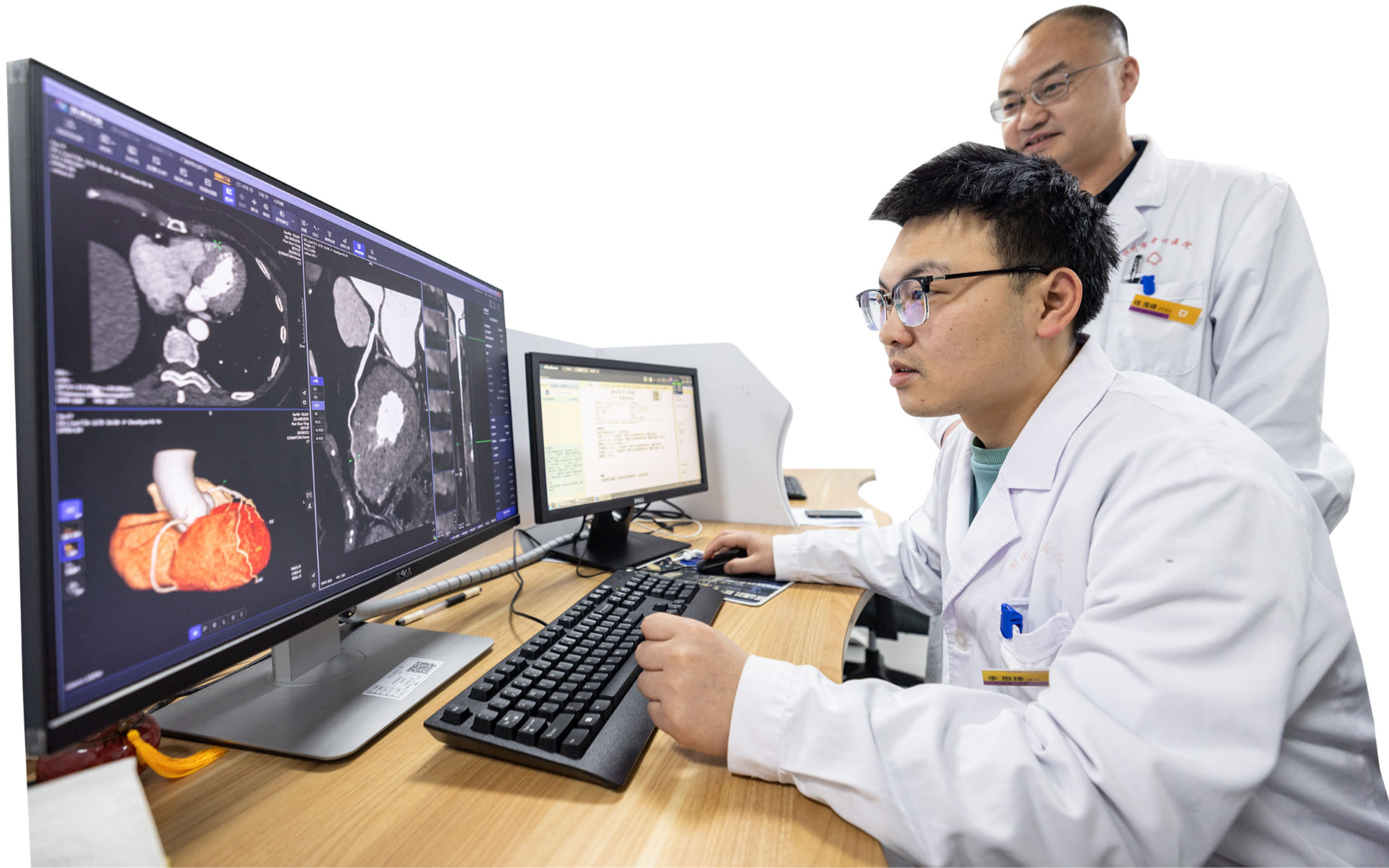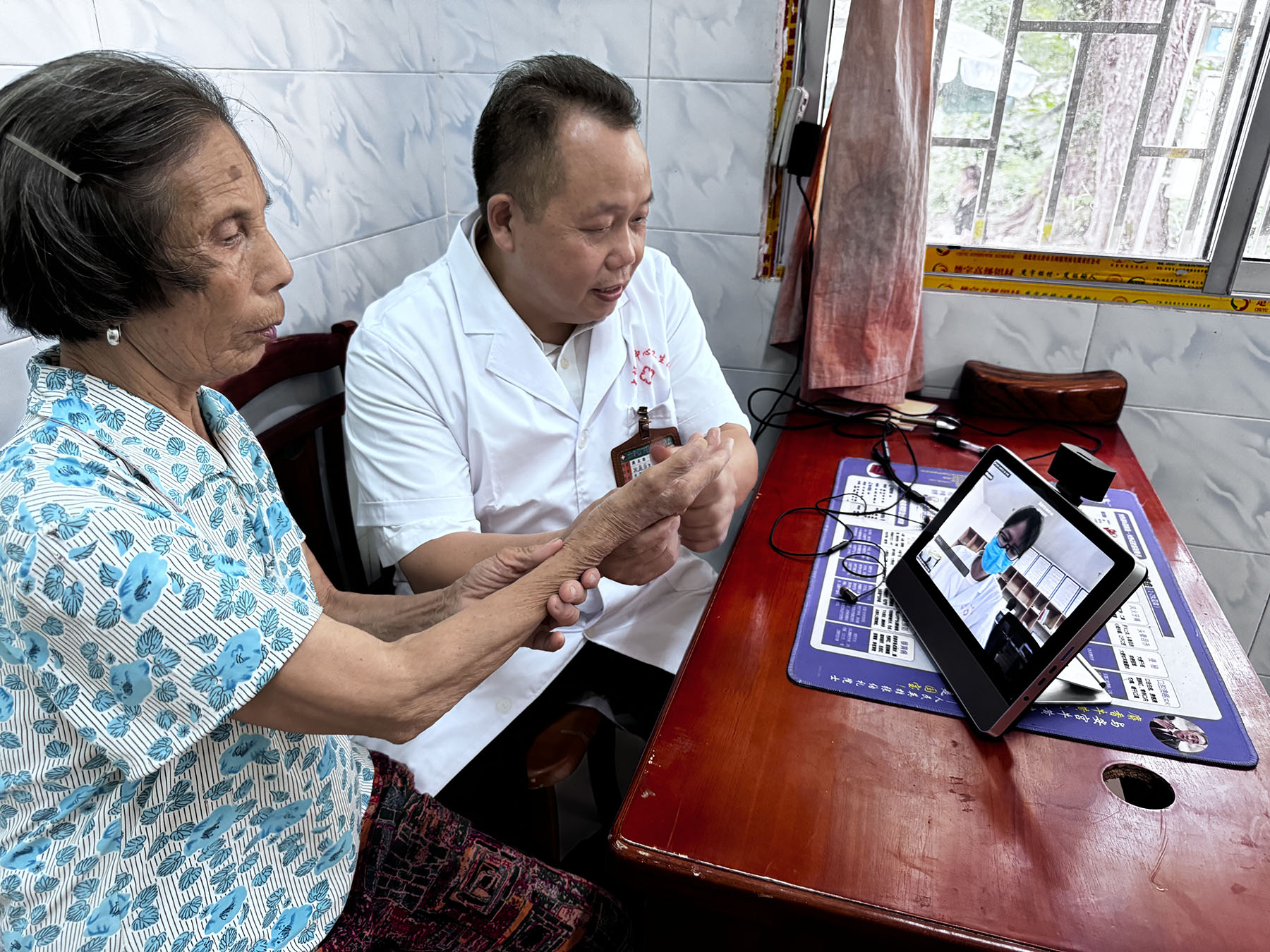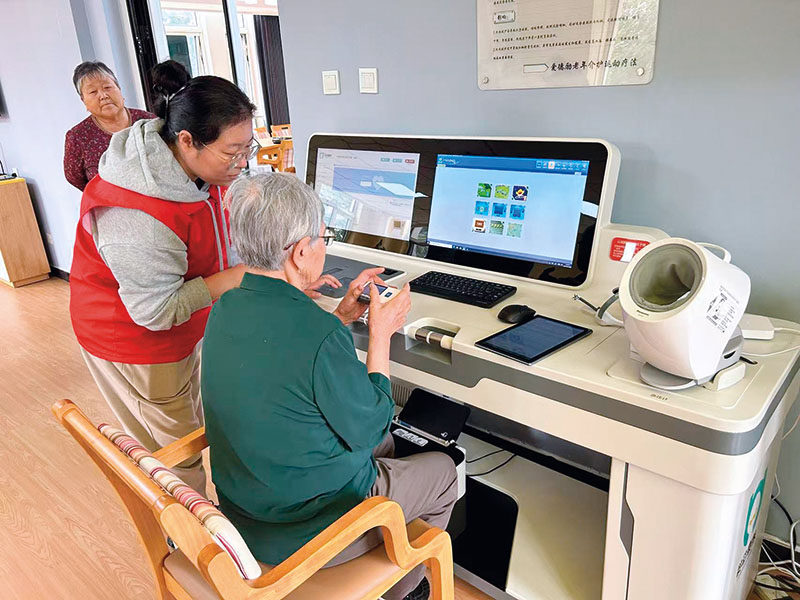Regulatory control, ethics issues still need to be tackled, experts say

Xu Ruru, 36, opened a taxi door to help his frail, elderly mother step onto the curb as a Beijing wind howled last winter.
In his hands, he held a thick stack of medical reports. Before the duo loomed the gate of a major hospital and a sign that read — "No entry. Use other gate."
A factory worker from Hengshui Hebei province, Xu balanced his mother's arm with one hand and their luggage with the other. With numb fingers, he fumbled for his phone — and pulled off his gloves with his teeth to check an online map of the hospital. The nearest entry gate was a 10-minute walk away.
It was Xu's eighth trip from Hengshui to Beijing in two years. His mother had never fully recovered after a traffic accident, joining a multitude of patients who visit the capita seeking advanced medical care.
"I mapped everything in advance," Xu said. "Still, there is always something to break us."
READ MORE: A minefield of AI mindfulness
On this visit, his mother needed a CT scan, X-ray and a blood test — each on separate hospital floors. Missing one appointment risked cancellation of the others.
In an online scramble, Zhao seized the 8:30 am CT slot and secured one of four appointment times.
"If we'd arrived minutes later after her other tests," he said, "we'd have lost it and needed to come back the next day."
Inside the hospital, similar scenes continue to unfold almost daily.
Patients become frustrated after forfeiting appointments because they have entered the wrong wing, or taken the stairs to the wrong floor.
Beijing's top hospitals see hundreds of thousands of patients every day. For locals it can be a challenge, for outsiders like Xu and his mother, a visit to a hospital can be a maze of wrong turns, ticking time and tricky logistics.

Easier access
What some patients accept as "normal" — multiple check-ins, scattered departments, tight scheduling — is what Tsinghua University's Institute for AI Industry Research aimed to address when it launched Agent Hospital 1 on June 30.
Agent Hospital 1 is a digital platform that patients can access to act as a personal health assistant, tracking their medical history and helping them locate the most suitable treatment facility or personnel.
For medical professionals, the platform performs as an assistant, providing advice and doing other less-pressing tasks.
The platform has a total of 42 AI "doctor agents" covering 21 specialist areas who can provide users with guidance and information. Agent Hospital 1's claimed purpose is to achieve the "impossible triangle", described by medical professionals as the meeting of "quality, affordability and access".
"When using the patient-client services, one will have access to several helpful features designed to improve the healthcare experience," said Liu Yang, executive dean of the institute, which developed the platform, one of the first of its kind in the world.
"It helps create and manage patients' personal health records, using past checkup information to analyze health and provide early warnings about potential concerns."
With a patient's permission, the platform's "patient assistant" gathers and organizes basic medical details for doctors ahead of time, making the appointment process more efficient.
If the patient is unsure where to start, the service offers an AI "nurse assistant" that suggests the right hospital department based on the symptoms described.
The assistant automatically collects relevant information from patients, helping them to make the consultation smoother.
"We are also building AI assistants to reduce doctors' administrative burden," Liu said.
Increased efficiency
The doctor function of the platform offers physicians several tools to enhance their handling of patients.
"It enables intelligent assistant collaboration during consultations, where AI-powered assistants provide real-time dialogue prompts and support parallel patient interactions to boost diagnostic efficiency," Zijing Zhikang, a company that assisted in the development of the program, said in a news release.
For critical decisions, the AI system delivers detailed suggestions, which augment diagnostic accuracy, but preserve the physician's ultimate decision-making authority.
Another feature allows doctors to build digital counterparts after enough interactions.
"The platform automates real-time medical record documentation, significantly reducing administrative burdens and allowing doctors to focus fully on patient care," Liu said. The system also assists with post-consultation follow-up reminders, releases appointment slots, and addresses clinical workflows, he added.
Powering the platform is the Simulacrum-based Evolutionary Agent Learning, an AI system developed by the Tsinghua institute.
Unlike AI trained on real patient data, which risks privacy breaches, SEAL generates synthetic populations that mirror human physiology. Its "digital patients" develop complex conditions from simulated air pollution or genetic mutations, training AI doctors through millions of "crises" no real hospital could ethically stage.

Beijing forum
However, for AI healthcare solutions to be used responsibly and help solve health issues, experts said frameworks for governance, ethical deployment and international collaboration are essential.
These challenges took center stage at a recent China-ASEAN forum, said Zhang Li, chief representative of the Asia-Pacific Medical Technology Association in China.
Experts from around Asia — attracted by China's development of the use of AI in public health — gathered in Beijing for the 3rd Forum on China-ASEAN Cooperation in Public Health from July 2 to July 4, aiming to deepen collaboration on AI-driven public health innovations.
AI usage in the field of medical care raises a wide range of concerns, the forum heard.
Many experts warned expanding the use of AI in healthcare has significant potential risks and ethical issues, such as identifying responsibility when accidents or mistakes happen in the treatment of patients. Misuse of patients' private information is another area that needs scrutiny.
Kidong Park, director of data, strategy and innovation at the World Health Organization's Western Pacific Regional Office, said the health organization advocates a dual approach in addressing the risks posed by medical AI — governance that focuses on value-based and ethical safeguards is key, working in tandem with regulation, which provides a legal baseline and accountability.
"This synergy is vital to harnessing AI's benefits for public health while preventing the exacerbation of health inequities," he said.
Unified approach
AI also has a pivotal role to play in dealing with the rising global burden of chronic disease and the growing need for drug development.
At the forum, Professor Xu Ming of Peking University addressed AI's impact on international clinical trials, using oncology drug development as an example.
"AI optimizes trials through automated participant screening, image analysis, and using real-world data to create synthetic control arms," Xu said.
He also emphasized the need for improvement of regulations to ensure ethical reviews and data security. Low- and middle-income countries should have equitable access to the technology, he added.
Across the Asia-Pacific region, AI applications in medical technology are seeing common challenges in areas such as access, capability and public trust, Su Fen Ong, an expert with the Asia Pacific Medical Technology Association's Digital Health & AI Committee, said at the forum.
ALSO READ: Shenzhen boosts healthcare with widespread AI adoption
Issues that need to be addressed include reimbursement mechanisms, cultivation of med-tech talent, and fostering cross-border data agreements. A multi-stakeholder governance system is also essential to realize AI's full value in healthcare, she added.
A number of experts at the forum recognized AI's huge potential in medical technology. They agreed that AI's healthcare applications are expanding beyond hospital-based tasks like diagnostics and administration, and reaching into areas like home care and chronic disease management.
Globally, consensus is growing on the need for safety, ethics, and regulation of AI medical products.
Joint efforts, transnational cooperation, and integrated hardware-software solutions are pathways to achieve a global impact, the experts said.
For patients like Xu's mother, AI healthcare is no longer abstract tech, but a new hope for a more efficient system.
"While innovations like Agent Hospital tackle these inefficiencies — coordinating care and freeing doctors — their true power for millions hinges on solving the bigger picture: ensuring ethical, equitable access across divides," Liu from the institute said.
Contact the writer at weiwangyu@chinadaily.com.cn


